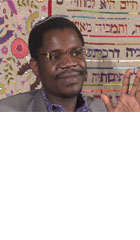
Black Israel 2003
Distributed by Filmakers Library, 124 East 40th Street, New York, NY 10016; 202-808-4980
Producer n/a
Directed by Maurice Dorés
VHS, color, 88 min.
Jr. High - Adult
Religious Studies, Jewish Studies, African American Studies, Middle Eastern Studies
Date Entered: 06/18/2004
Reviewed by Sheila Intner, Professor, Graduate School of Library & Information Science, Simmons College GSLIS at Mt. Holyoke, South Hadley, MAThrough a series of interviews with Black Jews from Africa, the United States, and the Caribbean, augmented by live action segments showing interviewees in their home settings in Israel, this film documents the presence of people of color in Judaism and its multicultural, multiracial character. “Judaism has no color,” declares one of the subjects, whose antecedents practiced Biblical Judaism in Africa for generations before he moved to Israel to pursue his spiritual roots.
Communities of Black Jews are scattered all over Israel, from Dimona in the Negev to Haifa on the Mediterranean Sea. Some moved to Israel as a group, though none of the interviewees say religious persecution in their original homelands prompted them to go. Except for the Ethiopians, whose airlift to Israel was publicized widely in the West (and funded, in part, by Diaspora Jews), the groups of Black Africans from Nigeria, Congo, and other African countries are not usually mentioned when immigration to Israel is discussed. They are part of the “and others” that follows mention of waves from Europe (Ashkenazim), the Middle East and Iberia (Sephardim), and former Soviet Socialist Republics.
Black Jews are not all recognized as Jews by Israel’s religious establishment, who exclude those who were not born and raised in the tradition of Rabbinic Judaism. (Biblical Judaism is based solely on the text of the Five Books of Moses or Torah; Rabbinic Judaism is based jointly on the Torah and the Talmud - a body of commentary that details day-to-day applications of the basic rules of the Torah - as well as on later “responsa” -rulings of rabbinic authorities on fine details of Jewish law. The Torah is like a “Constitution” of Jewish law; the Talmud translates it into a code of legislation and case law; and the responsa are specific judgments about details the code does not cover, either because the matter didn’t exist or never arose in Talmudic times.) To be considered Jews by the State of Israel, they must be converted by an Orthodox rabbi, who, to conform to tradition, must deny them conversion three times to dissuade any whose commitment to Judaism is not sufficiently strong. Several segments show services being held in Israel and New York City’s Harlem. The Jewish spirituality of all of these people appears to be as profoundly felt and sincere as that of Jews anywhere in the world.
The film is not fancy or dramatic, but is well-paced, -taped and -edited, and has English subtitles for its multilingual soundtrack (Hebrew, French, and English), which are generally readable.
Black Israel is highly recommended for jr. high, sr. high, college, and general adult audiences interested in Judaic studies, Religion in general, and area studies focusing on Israel as well as for general audiences interested in Jews, Israel, and/or people of color.